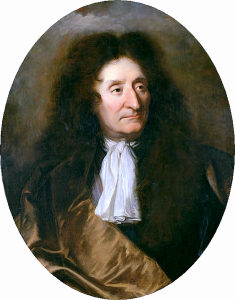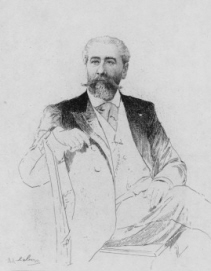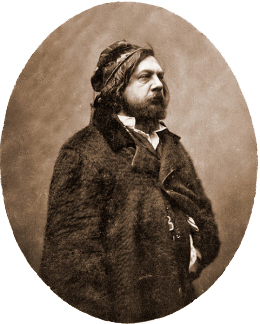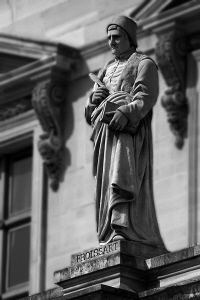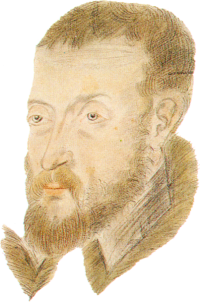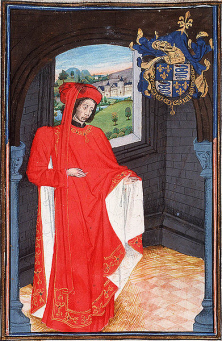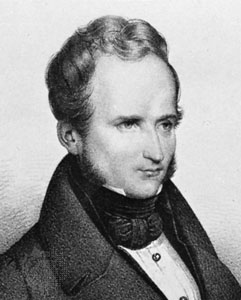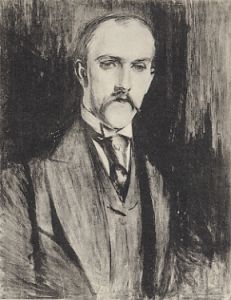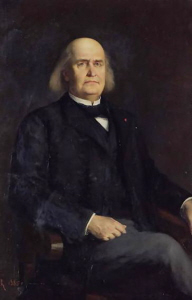
| LES ÉLÉPHANTS | THE ELEPHANTS |
| Leconte de Lisle | trans. Stan Solomons |
| Le sable rouge est comme une mer sans limite, Et qui flambe, muette, affaissée en son lit. Une ondulation immobile remplit L’horizon aux vapeurs de cuivre où l’homme habite. Nulle vie et nul bruit. Tous les lions repus Dorment au fond de l’antre éloigné de cent lieues, Et la girafe boit dans les fontaines bleues, Là-bas, sous les dattiers des panthères connus. Pas un oiseau ne passe en fouettant de son aile L’air épais, où circule un immense soleil. Parfois quelque boa, chauffé dans son sommeil, Fait onduler son dos dont l’écaille étincelle. Tel l’espace enflammé brûle sous les cieux clairs. Mais, tandis que tout dort aux mornes solitudes, Lés éléphants rugueux, voyageurs lents et rudes Vont au pays natal à travers les déserts. D’un point de l’horizon, comme des masses brunes, Ils viennent, soulevant la poussière, et l’on voit, Pour ne point dévier du chemin le plus droit, Sous leur pied large et sûr crouler au loin les dunes. Celui qui tient la tête est un vieux chef. Son corps Est gercé comme un tronc que le temps ronge et mine Sa tête est comme un roc, et l’arc de son échine Se voûte puissamment à ses moindres efforts. Sans ralentir jamais et sans hâter sa marche, Il guide au but certain ses compagnons poudreux; Et, creusant par derrière un sillon sablonneux, Les pèlerins massifs suivent leur patriarche. L’oreille en éventail, la trompe entre les dents, Ils cheminent, l’oeil clos. Leur ventre bat et fume, Et leur sueur dans l’air embrasé monte en brume; Et bourdonnent autour mille insectes ardents. Mais qu’importent la soif et la mouche vorace, Et le soleil cuisant leur dos noir et plissé? Ils rêvent en marchant du pays délaissé, Des forêts de figuiers où s’abrita leur race. Ils reverront le fleuve échappé des grands monts, Où nage en mugissant l’hippopotame énorme, Où, blanchis par la Lune et projetant leur forme, Ils descendaient pour boire en écrasant les joncs. Aussi, pleins de courage et de lenteur, ils passent Comme une ligne noire, au sable illimité Et le désert reprend son immobilité Quand les lourds voyageurs à l’horizon s’effacent. | The desert sand is like a sea, Flaming, silent, slumped in its bed. And desert waves, immobile, spread To far horizons and infinity. No life, no sound, the lions slumber Within their lairs a hundred leagues afar; Giraffes from azure fountains drink, Beneath the date-palms panthers slink. No passing birds wing their way here. The air is dense, the heavy sun bears Down. Snakes drowse and sometimes Contort themselves in torpid dreams. The burning space sears the pellucid skies, And in the solitude all beasts lie Inert, save elephants, slow paced Journeying back towards their natal place From the far horizon, massive, huge They trudge, raising the dust. One can see Wending their ponderous way Great feet crushing down the dunes. At their very head an ancient form Wrinkled and eroded by the time His head a great rock and his spine Arches powerfully at his slightest effort. Never slowing, never hastening, they follow Dusty trunk to tail, each close in his wake, Leaving behind them a deep sandy furrow These massive pilgrims and their patriarch. Ears fanned wide, trunk curled and listening, But eyes closed, trusting, bellies rumbling In the burning air. Their scent and sweat rising While all around a thousand insects humming. Ignoring thirst and the voracious flies The sun smarting their black and wrinkled back Trudging and dreaming of that land far back With groves of fig tree sheltering their race. Back where the mountain rivers rush. Enormous hippos swim and swoon, Drinking their fill, trampling the rushes, Wallowing ecstatic in the silver moon. Slow and determined come the travellers A black line in that sand so limitless. Fading till they are but a blur, And all resumes its ancient stillness. |
Trans. copyright © Stan Solomons 20o5
Video of setting (original French) by D W Solomons for spoken voice, clarinet and strings
| LES ELFES | THE ELVES |
| Leconte de Lisle | trans. Stan Solomons |
| Couronnés de thym et de marjolaine, Elfes joyeux dansent sur la plaine. Du sentier des bois aux daims familier, Sur un noir cheval, sort un chevalier. Son éperon d’or brille en la nuit brune; Et, quand il traverse un rayon de lune, On voit resplendir, d’un reflet changeant, Sur sa chevelure un casque d’argent. Couronnés de thym et de marjolaine, Les Elfes joyeux dansent sur la plaine. Ils l’entourent tous d’un essaim léger Qui dans l’air muet semble voltiger. – Hardi chevalier, par la nuit sereine, Où vas-tu si tard? dit la jeune Reine. De mauvais esprits hantent les forêts; Viens danser plutôt sur les gazons frais. – Couronnés de thym et de marjolaine, Les Elfes joyeux dansent sur la plaine. – Non! ma fiancée aux yeux clairs et doux M’attend, et demain nous serons époux. Laissez-moi passer, Elfes des prairies, Qui foulez en rond les mousses fleuries; Ne m’attardez pas loin de mon amour, Car voici déjà les lueurs du jour. – Couronnés de thym et de marjolaine, Les Elfes joyeux dansent sur la plaine. – Reste, chevalier. Je te donnerai L’opale magique et l’anneau doré, Et, ce qui vaut mieux que gloire et fortune, Ma robe filée au clair de la lune. – Non! dit-il.- Va donc! – Et de son doigt blanc Elle touche au coeur le guerrier tremblant. Couronnés de thym et de marjolaine, Les Elfes joyeux dansent sur la plaine. Et sous l’éperon le noir cheval part. Il court, il bondit et va sans retard; Mais le chevalier frissonne et se penche; Il voit sur la route une forme blanche Qui marche sans bruit et lui tend les bras: – Elfe, esprit, démon, ne m’arrête pas! – Couronnés de thym et de marjolaine, Les Elfes joyeux dansent sur la plaine. – Ne m’arrête pas, fantôme odieux! Je vais épouser ma belle aux doux yeux. – Ô mon cher époux, la tombe éternelle Sera notre lit de noce, dit-elle. Je suis morte! – Et lui, la voyant ainsi, D’angoisse et d’amour tombe mort aussi. Couronnés de thym et de marjolaine, Les Elfes joyeux dansent sur la plaine. | Crownèd with thyme and marjoram The Elves dance joyous on the plain. From out the forest path, known to the deer On jet black steed there rides a cavalier. His spurs of gold flame in the sombre night. And passing through the pale moon`s shimmering light One sees, splendid and radiant, flashing fair, A helm of silver on his tossing hair. Crownèd with thyme and marjoram The Elves dance joyous on the plain. In aery swarm they gird and hem him there, Flitting and floating on the muted air. “O cavalier, bound through the night serene, Where goest thou so late” said the young Queen. Knowest thou not that evil is abroad, Rather come dance with us on the cool sward”. Crownèd with thyme and marjoram The Elves dance joyous on the plain. “No, for my clear and gentle eyed betrothed Awaits . Early tomorrow we`re to wed. Elves of the meadow, pray you let me by, Ye who on mosses fairy circles ply. Far from my love, O force me not to stay, For even now I see the gleams of day.” Crownèd with thyme and marjoram The Elves dance joyous on the plain. “Stay! And I`ll give to thee, my rider bold, The magic opal and the ring of gold, And what is better far than fame or fortune, My robe spun shrewdly by the light of moon”. “No!” said he. “Go then!” She, with finger stark Touches the trembling warrior to the heart. Crownèd with thyme and marjoram The Elves dance joyous on the plain. The black steed rears and leaps beneath the spur, Rushing and bounding, flying fast and far; But on its back the rider reels and shivers, Sees in his path a pallid spectre quiver, Noiselessly nearing, stretching forth its arms: “Elf! Spirit! Stay me not! Do me no harm!” Crownèd with thyme and marjoram The Elves dance joyous on the plain. “Odious phantom, force me not to stay, For I must wed my gentle love this day!” “O my dear spouse, the tomb, eternally, Shall be our only bridal bed, says she, For I am dead!” and he, seeing ‘tis true, With love and anguish falls a dead man, too. Crownèd with thyme and marjoram The Elves dance joyous on the plain. |
Trans. copyright © Stan Solomons 2006
Video of setting by D W Solomons for guitar, cello, recorders and voices
| LA GORGE À SAINT GILLES | THE RAVINE AT SAINT GILLES |
| Leconte de Lisle | trans. Stan Solomons |
| La gorge est pleine d’ombre où, sous les bambous grêles, Le soleil au zénith n’a jamais resplendi, Où les filtrations des sources naturelles, S’unissent au silence enflammé de midi. De la lave durcie aux fissures moussues, Au travers des lichens l’eau tombe en ruisselant, S’y perd, et se creusant de soudaines issues, Germe et circule au fond parmi le gravier blanc. … … Ainsi, sur les deux bords de la gorge profonde, Rayonne, chante et rêve, en un même moment, Toute forme vivante et qui fourmille au monde, Mais formes, sons, couleurs s’arrêtent brusquement. Plus bas, tout est muet et noir au sein du gouffre, Depuis que la montagne, en émergeant des flots, Rugissante, et par jets de granit et de soufre, Se figea dans le ciel et connut le repos. À peine une échappée, étincelante et bleue, Laisse-t-elle entrevoir, en un pan du ciel pur, Vers Rodrique ou Ceylan le vol des paille-en-queue, Comme un flocon de neige égaré dans l’azur. Hors ce point lumineux qui sur l’onde palpite, La ravine s’endort dans l’immobile nuit; Et quand un roc miné d’en haut s’y précipite, Il n’éveille pas même un écho de son bruit. Pour qui sait pénétrer, Nature, dans tes voies, L’illusion t’enserre et ta surface ment: Au fond de tes fureurs, comme au fond de tes joies, Ta force est sans ivresse et sans emportement. Tel, parmi les sanglots, les rires et les haines, Heureux qui porte en soi, d’indifférence empli, Un gouffre inviolé de silence et d’oubli! Un impassible coeur sourd aux rumeurs humaines. La vie a beau frémir autour de ce coeur morne, Muet comme un ascète absorbé par son Dieu, Tout roule sans écho dans son ombre sans borne, Et rien n’y luit du ciel, hormis un trait de feu. Mais ce peu de lumière à ce néant fidèle, C’est le reflet perdu des espaces meilleurs! C’est ton rapide éclair, Espérance éternelle, Qui l’éveille en sa tombe et le convie ailleurs. | Shade in the gorge. Beneath the bamboo stems The sun in apogee has never shone; The lucent crystal threads of water stem Forth to merge in burning silences of noon. From solid lava with its mossy flaws, Across the tawny lichens water streams, Is lost, from unexpected issue flows, Resumes its pebble bed with swirl and gleam. … … So, on both sides the gorge, this deep-set gash, Together shine and sing and dream and sport All living forms of earth who joy and flash; But in the depth, colour and sound stop short. Lower. Dumb and dark in the abyss, E’er since the mountain surged up from the flood, Roaring in pain and spitting molten jets, Froze into space, knew peace and cooled its blood. Sparkling and blue, barely a fleeting sight Is left, the mountain looms in the sky pure; Toward Ceylon the phaeton bird in flight Is like an errant snowflake in the azure. Besides this shining point of life which throbs O’er sea, the ravine in still night sleeps sound, And when a boulder undermined drops, It wakes not even an echo of its sound. Nature, for those who penetrate thy ways, Illusion binds thee with its lying sheen. Beneath thy fury as beneath thy joy, Is strength without hysteria or spleen. For those, beset by laughter and by hate, Carry within an inner joy, all care bereft, A gulf inviolate of silence made! A soul towards all human noise that’s deaf. In vain the world will shimmer round their soul, Mute as an ascete mingled with his God, Within his shadow limitless and whole, No sound, no heavenly light, an abode With but a thread of light in the abyss, The lost reflection of a higher space, A flash of Hope, trace of eternal Bliss, Which wakes them in their tomb and lends them grace. |
Trans. copyright © Stan Solomons 2006
| MIDI | NOON |
| Leconte de Lisle | trans. Stan Solomons |
| Midi, roi des étés, épandu sur la plaine, Tombe en nappes d’argent des hauteurs du ciel bleu. Tout se tait. L’air flamboie et brûle sans haleine; La terre est assoupie en sa robe de feu. L’étendue est immense, et les champs n’ont point d’ombre. Et la source est tarie où buvaient les troupeaux; La lointaine forêt, dont la lisière est sombre, Dort là-bas, immobile, en un pesant repos. Seuls, les grands blés mûris, tels qu’une mer dorée, Se déroulent au loin, dédaigneux du sommeil; Pacifiques enfants de la terre sacrée, Ils épuisent sans peur la coupe du soleil. Parfois, comme un soupir de leur âme brûlante Du sein des épis lourds qui murmurent entre eux, Une ondulation majestueuse et lente S’éveille, et va mourir à l’horizon poudreux. Non loin, quelques boeufs blancs, couchés parmi les herbes. Bavent avec lenteur sur leurs fanons épais, Et suivent de leurs yeux languissants et superbes Le songe intérieur qu’ils n’achèvent jamais. Homme, si, le coeur plein de joie ou d’amertume, Tu passais vers midi dans les champs radieux, Fuis! la nature est vide et le soleil consume: Rien n’est vivant ici, rien n’est triste ou joyeux. Mais si, désabusé des larmes et du rire, Altéré de l’oubli de ce monde agité, Tu veux, ne sachant plus pardonner ou maudire, Goûter une suprême et morne volupté, Viens! Le soleil te parle en paroles sublimes; Dans sa flamme implacable absorbe-toi sans fin; Et retourne à pas lents vers les cités infimes, Le coeur trempé sept fois dans le néant divin. | Noon, monarch of summer, ruling o’er the plain, Falling in silver sheets from azure height. All is still. Breathless the air is flame; The earth is drowsy in its robe of light. Distance is dazzling vast, the fields lack shade, The spring is dusty dry where drank the sheep; The far-off forest, with its sombre glade Lies there so still, heavy in drug-like sleep. Like seas of gold, only the tall ripe corn Rolls to the distance and all sleep disdains; Peace-loving child of sacred Nature born, Fearless, the cup of sun-liqueur it drains. Sometimes, like sighs forced from its burning soul, From out the heavy grain’s murmuring breast, Majestic, slow, waves wake and roll To dusty horizon to meet their death. Close by, white oxen, resting on the sward, Salivate gently on thick dew-lapped neck, With eyes, placid and proud, follow and hoard That inmost thought, never achieved as yet. If, filled with spleen or joy, you pass at noon Among those sonorous radiant fields of light, Flee! Nature is empty and the sun consumes; Nothing is living, nothing sad or bright. But if, purged free of tears or smiles, athirst To cast away their frantic memory, If then you wish, knowing nor grace nor curse, To taste a sensuous supremacy, Come then! The sun will speak to you in shining words; Within its ruthless flame live through eternal time; Take back with you towards the petty world A heart steeped seven-fold in the void divine. |
Trans. copyright © Stan Solomons 2006

